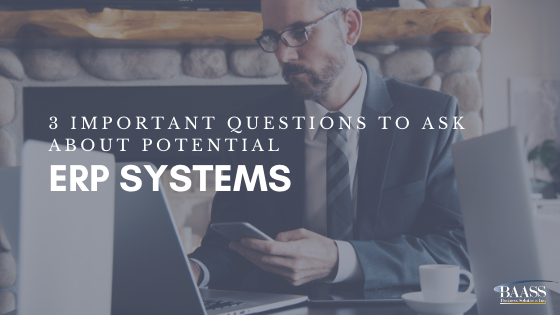
Manufacturers considering ERP systems would be wise to consider these three questions, and pursue solutions that satisfactorily answer them. Manufacturers have specific needs when it comes to ERP systems. Some of these needs are “nonnegotiable” and essential to get the most out of your ERP implementation. Failing to ask key questions can lead to a poor implementation experience.
Three Critical ERP Questions for Manufacturers
-
Have you received feedback from the entire team?
The worst thing you can do is begin speaking with vendors and consultants about ERP systems without complete feedback from the entire team back at the plant or office who intend to use the system. Input from all areas within an organization is essential to help you choose the best system for your needs. Without such input, you may be guessing when it comes to what the accounting department needs, for example, or misunderstanding the needs of other critical departments. Invite key managers and support staff to discovery meetings and take copious notes to help you form a ‘wish list’ for a project scope. -
Is this system configurable?
The ease with which systems can be configured is an important part of your decision-making process. But a system that must be configured to the point of being unrecognizable from the original solution defeats the purpose of shopping for an ERP system in the first place. You might as well build an entirely custom system for the amount of time and money extensive configurations will use. Balance the need for configuration with the need for a solution to meet your requirements as much as possible ‘off the shelf’ without any tweaks or changes. When the balance shifts in favor of an off-the-shelf system, with minimal customization needed, you’ve probably found a worthwhile solution. -
Is this system made for manufacturers?
ERP systems can be made for general business purposes or specific purposes, such as manufacturing. If a system is too general, it won’t include the functionality that you require to run your manufacturing business. There are many ERP options made with manufacturers in mind. Don’t settle for a generic option. Too much customization on an ERP system may lead to inefficiencies. It is better to begin with the right solution than to fit a square peg into a round hole.
What to Look for in ERP Systems for Manufacturers
There are many aspects of an ERP system created for the manufacturing sector that you may wish to look for when examining potential systems. These include:
- Supply chain management and visibility
- CRM (customer relationship management)
- Stock reports and inventory management
- Production planning and control
- Barcode generation, tracking and routing
- Inventory management and reports
- Billing and managing complex billing cycles
- Managing complicated production cycles
You may have your own items to add to the list that are specific to the products you manufacture. An ERP system for manufacturing will include most, if not all, of these considerations. As you explore your options, keep this and the three key questions in mind to find the best solution for your business needs.
Blog: The 5 Stages of ERP Implementation
BAASS can help you decide on the right ERP system for your company’s needs, and assist you with your ERP implementation. We offer insights, expertise and service to help companies choose and implement terrific systems. Learn more about our ERP experience and speak with us today.
